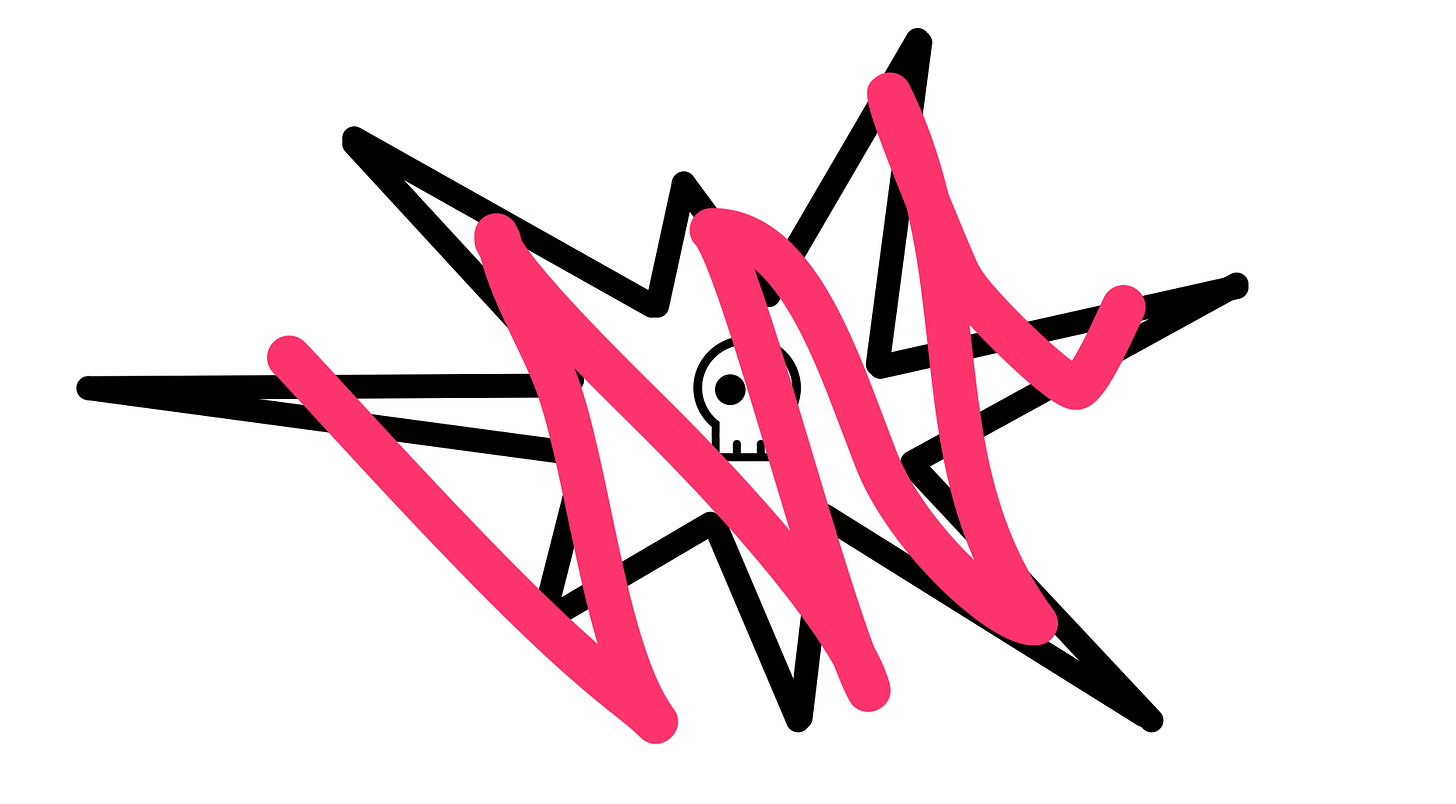Week 12
It has been three months! In the recording above, I recap the last 12 weeks and describe where I want to go next. [5 min]
The main points:
I’ve fulfilled my 12-week commitment! 🎉
CURZIISM will continue for at least another 3 months, at which point I’ll reassess again.
Newsletters will now arrive every 2-3 weeks, rather than weekly, as I try to increase content quality.
I might add more audio?
Thank you for reading! Seriously, I appreciate it.
And now, our essay for the week…
Grim optimism, nihilistic pleasure
Do you wrestle with dreams?
Do you contend with shadows?
Do you move in a kind of sleep?
Time has slipped away.
Your life is stolen.
You tarried with trifles.
Victim of your folly.- Frank Herbert, Dune
Pessimism vs nihilism
We’ve all heard the phrase: “Winter is Coming”. In That Damnable Fantasy Series it literally refers to, you know, winter. But the saying is not just literal; it’s an ethos. It says: “difficulty lies ahead.” Or perhaps: “There will be a reckoning.”
It’s grim. But how grim it? On some reads, “Winter is Coming” is positively doomer-ish. It says the future will be bad. It might seem depressive.
But in times as troublesome as our own, it can be useful to remember that pessimism and doomsaying are not the same thing. If you expect difficulty, you might prepare. That’s not nihilistic, it’s just practical. I’m not sure practicality can be hopeless.
And while the Starks like telling you winter is on its way, they’ll probably stop saying it once you’re hip-deep in snow. One doesn’t imagine them proclaiming: “see, we’re totally screwed! I told you so!” That’s not the point. They’re more likely to say “let’s go gather some wood.”
In other words, “Winter is Coming” isn’t the same as saying “we’re fucked”. It’s not the same as “the End is Nigh”. If “The End is Nigh” is the ghost chili pepper of nihilism, “Winter is Coming” is a gentle habanero.
Who should heed the Starks?
Let’s suppose, arguendo, that ‘Winter is Coming’ is something that needs saying. If it needs saying, who needs to hear it?
I’m not the biggest fan of Game of Thrones, but I’m told that in that universe, the grim Starks can be contrasted with a clan of Flower Knights and all-around Summer People, who spend their days in delight with wine and gardens and scantily clad women. (I’m probably butchering the lore here, but you’re going to have to forgive me. This is to pay Mr. R. R. Martin back for making me sit through three seasons of that show.)
What a delightful way to live! It seems more fun than being a Stark. Why bother yourself with all that Winter, when you could have this?
While ‘Winter is Coming’ is pessimistic, this gathering says: “Things are great! They’ll be fine! Let’s enjoy what we have - and you should have a lemon bar, cutie.”
But I’m not ready call this ‘cheerfulness’ deeply optimistic. The appearance of hope can be thin and insincere. While their neighbors prepare for Winter, our fauns and cupids bury their worries under pleasures and distraction; this is not hopeful, it’s a terrified way to live. When pressured to comment on the prospect of darkness - surely a party foul, at such a soiree - our guests might admit that they really just want to shutter their eyes with pleasantries, and not think about. Their survival instinct has withered, crowded out by the hunger for cheer.
So if we were to make the case for Winter is Coming, we might say that the Starkish gospel holds the grim conviction that hardness and grit pay off in the long run. It aims to counteract the feverish, hedonistic insanity that suggests, hopelessly and dishonestly, that there’s no point preparing for difficulty.
Enter the Happy Gas
Tanks of Happy Gas™ are carried in a stylish backpack. At the first sign of danger, all you need to do is press a little button and inhale through the included gas mask. It makes a satisfying kshhhhh sound. It has a euphoric, anesthetic, and soporific effect.
You’ve just come out of a bubble bath, and are making your way to pilates, when Bob Stark rounds the corner: “Winter Is Coming,” he says. “WHOA there Bob! You startled me!” You don’t really want to think about the Winter.
*kshhhhhhhh* Ahhhh. That’s so much better. “Bob, you’re such a Stark, lol! I’ll see you at billiards tonight.” <Bob stalks off, grimly>
Happy Gas, of course, is a thinly veiled analogy for a certain approach to hedonism. My criteria for Happy Gas are something like:
Things which are physically unnecessary
Which produce ‘experiential goodness’ (complexly understood) without corresponding life progress
Which are accessed with great ease
Which help us to become distracted
You know, the usual suspects: food, porn, fiction, alcohol, drugs, Pinterest, video games.
And stranger things. My own view, which I’ve rarely heard expressed, is that hedonism isn’t all about positivity; it’s about feeling. We can distract ourselves from worldly cares with ‘unpleasant’ things, as long as those things are engaging: indulgent misery, self-harm, the frenzy of politics, wrath, victimhood. Among Lovecraft’s protagonists are a pair addicted to the ecstasy of horror: “with the satanic taste of neurotic virtuosi we had assembled an universe of terror and decay to excite our jaded sensibilities.” I find this psychologically realistic.
What truly counts as Happy Gas will vary by the person. If you’re not sure if something counts, check how you’d feel about going without it for a while.
Fiction is a great example. How would you feel about cutting out all books, TV shows, movies, or games for a month?
I’m not saying you have to do it. I’m just saying that the miniature panic attack is a little odd.
Hedonism as self-management
Without our precious Gas, our thoughts are drawn to darker things:
But we all obfuscate our problems, with mantras and Cinnabons and psychological sleight-of-hand. This conveniently interrupts our understanding of what ails us:
Grim folk like the Starks encourage cutting back on hedonistic distraction, in order to expose our problems more. The Stoics have this ethos, for example:
On the other hand, there’s a type of person who hides as much badness they can, chasing buoyant optimism like a drug, no matter the cost:
I’m not pure enough to condemn Happy Gas; that would make me a hypocrite. But on occasion, I do notice a sense of being trapped by it. Little doubts appear, in a corner of my mind yet-unconquered by the pink glowing haze. Has bliss caused me to forget about something else, something I really should go and handle? I notice the creeping shadows by the door.
Maybe I should cut the habit. Or at least take a week off. Erm, even a day would be good. But that thought makes me a little anxious. *kshhhhhh*
Whither asceticism?
This model provides a way to understand asceticism. The ascetic sees Happy Gas cluttering their senses, and wants to unroot the habit in its entirety. To come clean, they cut out not only the worst contaminants (e.g. porn or lemon bars), but also the little corruptions normal people consider harmless, like sugar in our tea.
You might be inclined to an intense approach if you think you’re at a severe risk of self-delusion. I’ve witnessed the demon myself: the frenetic hunger for shallow experiential positivity, hacking the pleasure centers, numbing and dulling our instincts for reality. We’re two-faced; one face insists it’s only fair that we make things a little easier on ourselves, while the other is hard at work with a shovel, burying our still-living problems and obligations and concerns.
The account I’m giving rhymes with religious traditional worldviews around ‘sins of the flesh’, the corruption of the world, the rabidness of sin and self-delusion, etc. Now, I’m not saying it’s time to declare the Curziist Theocratic State. But I’ll admit I find it interesting.
The ascetic breaks the cycle of addiction by living the Cold Turkiest of lifestyles. His turkey is ice cold. This approach is bitterly difficult and painful. But on the bright side, once addiction is shattered, once illusion dies its spasmodic and rapturous death, a much better life is possible.
Because in theory we have a chance to, you know, act better. Instead of numbing ourselves, while blistering our hands on burning coals. We have a chance to feel the chilly wind, coming through the window - and start preparing for the winter ahead.














